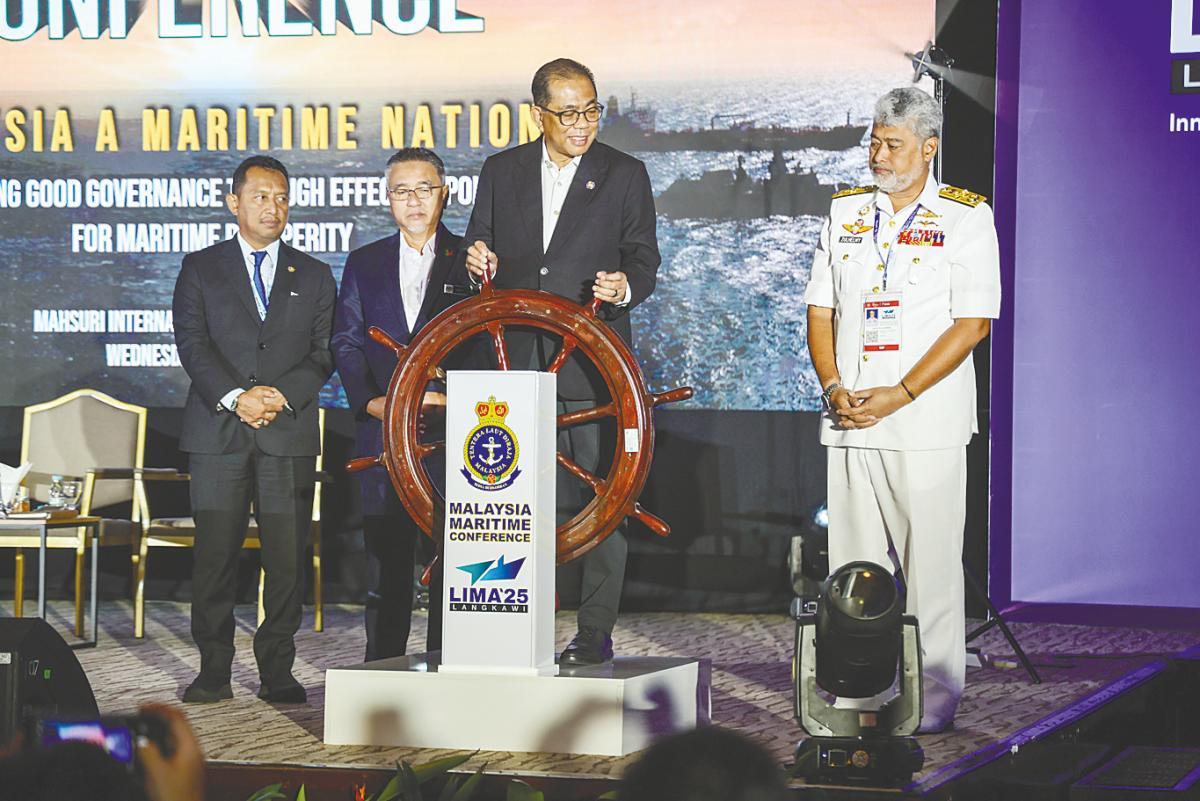LANGKAWI: Malaysia will enhance interagency coordination, expand maritime domain awareness and foster greater synergies among government institutions, private stakeholders and regional partners to address the critical importance of sustainable marine resource management.
Defence Minister Datuk Seri Mohamed Khaled Nordin said Malaysia is a maritime nation, positioned at the crossroads of major sea trade routes, and responsible for safeguarding the security, sustainability and prosperity of the country’s maritime domain.
“Maritime trade remains the lifeblood of our economy, with over 90% of our trade being conducted via sea routes.
“Whether through offshore renewable energy projects, sustainable fisheries or major discoveries in marine biotechnology, our efforts focus on securing long-term prosperity while protecting the health of our seas,” he told delegates today when officiating the Malaysia Maritime Conference 2025 at the ongoing 17th Langkawi International Maritime and Aerospace Exhibition (Lima 2025).
Beyond trade, Khaled said, Malaysian waters hold vast untapped potential, and unlocking it requires economic foresight, robust governance, strategic policymaking, and a steadfast commitment to maritime security. “While we greatly benefit from our maritime nation status, this privilege comes with significant challenges and responsibilities.”
Khalid said rising maritime traffic, overlapping territorial claims, marine pollution and climate change demand more than just a strategy.
Facing these challenges requires a forward-thinking approach to ensure long-term resilience and adaptability in the country’s maritime governance, he added.
“Thus, our approach to maritime affairs must be guided by a vision that prioritises shared prosperity for all Malaysians, safe international trade routes and overall regional peace and stability. While our maritime governance structure is comprehensive, we must also strive for greater coherence and efficiency to face the ever-evolving challenges.”
Currently, Khaled said, Malaysia enforces over 15 maritime-related acts and orders, with responsibilities shared among more than 30 agencies and multiple ministries.
He said overlapping jurisdictions, inefficiencies, and resource constraints must be urgently addressed.
“Moving forward, the government is firmly committed to establishing an integrated maritime governance. This includes streamlining maritime law enforcement to eliminate redundancies and improve interagency coordination, enhancing digitalisation and data sharing to bolster maritime domain awareness through real-time intelligence and surveillance, and formulate a national maritime policy to align economic security and environmental priorities.”
Khaled said Malaysia will also reinforce its legal framework to combat illegal fishing, marine pollution and foreign encroachments into the country’s waters. By strengthening enforcement mechanisms, Malaysia will ensure accountability and deter illicit maritime activities.
Touching on maritime security, Khaled said true economic prosperity cannot be achieved without security at sea.
He said both traditional and non-traditional threats, including illegal, unreported and unregulated fishing, piracy, smuggling and marine pollution, continue to challenge Malaysia’s sovereignty.
Disruptions in supply chains, shifting geopolitics and emerging security threats further emphasise the need for a strong and coordinated maritime defense posture.
“Malaysia will continue to enhance its naval and maritime enforcement capabilities to protect our national interests. “In addition, we must keep up with the rise of emerging and disruptive technologies that can optimise our ability to address maritime concerns,” Khaled said.
To improve Malaysia’s maritime security, the government will boost spending on advanced surveillance technologies, such as using autonomous unmanned vehicles, sharing intelligence, and conducting joint naval exercises with reliable international partners to be prepared for new threats.
“The path towards maritime prosperity may be challenging, but we must navigate it together with determination and unity.
“In doing so, we must also pay close attention to the rise of emerging technologies such as the use of artificial intelligence for data analysis and maritime threat monitoring, the importance of underwater cable network within the regional waters, which is one of the issues raised during the last Asean Defence Ministers’ Meeting Retreat, and, finally, undersea research and exploration, such as undersea features naming activities.
“All these issues must not be ignored while discussing the maritime agenda,“ Khaled said.









